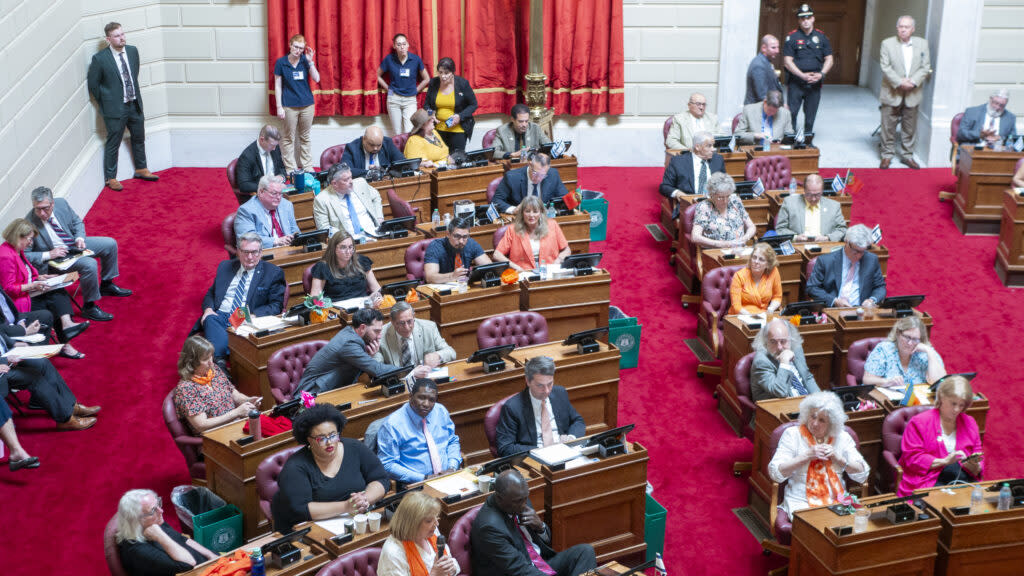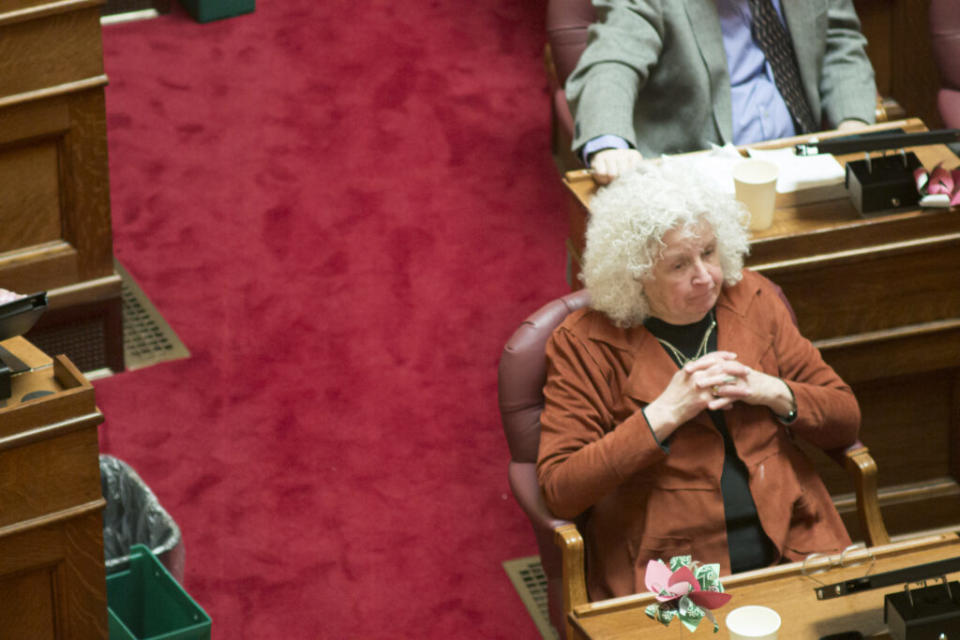A sampling of winners and losers of the 2024 legislative session

- Oops!Something went wrong.Please try again later.
Lawmakers in the Rhode Island House of Representatives are shown hard at work on May 28, 2024. (Alexander Castro/Rhode Island Current)
Lawmakers introduced more than 2,500 bills, resolutions, acts, condolences and congratulations during the nearly six-month legislative session that ended last week. But, as always, only the fittest survived.
Only 350 pieces of legislation would be considered “essential” bills, according to information shared by the General Assembly. (Resolutions, charter revocations and committee creations are excluded.)
About two-thirds, or 240 bills, cleared the multi-hurdle race of committee hearings, floor votes and cursory second approvals — a process known as concurrence — to cross the finish line by the end of session on June 14.
That number is nearly identical to the total approved during the 2023 and 2022 legislative sessions.
Here’s a microscopically small sample of the winners and losers from the 2024 session.
WINNERS
The housing heavyweight triumphs once more
Speaker K. Joseph Shekarchi’s single-minded focus on housing again provided a winning strategy in the 2024 legislative session, with 13 of the 14 bills in his housing package approved by both chambers. That includes the high-profile accessory dwelling unit bill, along with a flurry of complementary proposals aimed at making it easier to build across different cities and towns and in a wider range of areas, while streamlining state data and reporting. While not part of Shekarchi’s priority package, the Legislature also gave the rubber stamp to Rep. Jacquelyn Baginski’s bill overturning the existing three-people per single-family house limit, replacing it with a maximum of five unrelated people per home, or one person per bedroom.
“We need to think outside the box to find solutions to our housing crisis,” Shekarchi said in an emailed statement on Monday. “The bottom line is that we are making real, substantive progress in addressing Rhode Island’s housing and homelessness crisis. This crisis has been decades in the making and requires a long-term, sustained effort to fix. I am committed to seeing this through until all Rhode Islanders have a good, safe home.”
The only bill to not cross the finish line from his package, sponsored by Rep. Joshua Giraldo, a Central Falls Democrat, would have relaxed municipal requirements to build duplexes. Giraldo’s bill languished in the Senate Committee in Housing and Municipal Government without a companion.
Shekarchi expressed disappointment that the duplex bill did not pass and pledged to work with lawmakers in the Senate on the proposal next year.
Another bill expanding where mobile and manufactured homes could be built was approved but substantially weakened by the Rhode Island Senate on the session’s final day. It swapped out the original statement that cities and towns “shall” allow mobile and manufactured homes anywhere single-family homes are allowed with the much less forceful “may.”

Cage-free? Not for now.
The infamous “chicken bill” that has ruffled feathers on Smith Hill for nearly a decade returned for the final night of legislative debate. The newly hatched plan, approved by both chambers, gives farmers until 2030 to get rid of traditional chicken cages, a four-year extension over the prior 2026 deadline.
It’s not quite as much time as the 2034 deadline initially pitched in the Republican-backed bill, but nonetheless marks a win for the only commercial egg producer in the state to whom these rules apply: Little Rhody Foods, in Foster.
Foster Republicans Gordon Rogers and Mike Chippendale, sponsors of the companion bills, pitched the late-night deal to their legislative colleagues as a boost not only for the farm, but also its 20 employees and the two dozen local, small businesses who are customers. Will the business use its extra time to finally figure out an alternative to the small-space cages deemed inhumane by animal rights’ organizations? Don’t count your (cage-free) chickens yet.
Shining the spotlight on solar panel sales
Watch out, solar panel retailers. State regulators are watching now, more closely than ever, following a new law laying out a registration, licensing and enforcement framework for the companies that sell solar panels in Rhode Island. The law, signed by Gov. Dan McKee on May 10, comes amid a rise in consumer complaints and in one case, a lawsuit, over alleged fraud by door-to-door solar sales companies. The nascent industry has been largely unregulated, but starting March 1, 2025, will have to answer to the Rhode Island Department of Business Regulation (DBR).
Meanwhile, the Rhode Island Office of Attorney General’s lawsuit against Smart Green Solar over deceptive and predatory sales tactics is still making its way through Providence County Superior Court, following a failed attempt by company CEO Jay Gotra to dismiss the lawsuit, according to online court records.
Attorney General Peter Neronha lauded the new law in a statement as a way to prevent similar fraud by other companies.
“When fully implemented through DBR regulations, this legislation will allow Rhode Islanders to confidently purchase solar equipment while supporting our state’s climate goals,” Neronha said.

Way back when? Getting tough on DUI repeat offenders
Having a DUI conviction over the last 10 years could mean harsher penalties if you are arrested for impaired driving again under legislation passed by the General Assembly. Rhode Island is the most lenient state in New England when it comes to penalizing repeat offenders, but companion bills by Sen. V. Susan Sosnowski, a South Kingstown Democrat, and Rep. Patricia Serpa, a West Warwick Democrat, would change that. Their bills would extend the limit on prior offenses that police take into consideration when charging an impaired driver with a more serious repeat offense from five years to 10.
The legislation now awaits Gov. Dan McKee’s signature. McKee spokesperson Andrea Palagi said it was still being reviewed as of Thursday. Should it receive that final approval, the legislation takes effect July 1, 2025.
A “look back period” is the span of time DUI convictions are taken under consideration when determining if a new DUI offense should carry stricter penalties. Under the existing law, any offense that happens more than five years ago is not considered, making a new offense subject to the penalties that apply to a first offense.
Under existing law, Rhode Island has the shortest period of looking back at prior offenses in New England. Connecticut, Maine and New Hampshire each have 10-year look back periods, while Massachusetts and Vermont consider lifetime records.
A second DUI offense for drivers found to have a blood alcohol content between .08% and .15% means a mandatory fine of $400 and suspension of their license for up to two years, along with a minimum 10-day jail sentence.
Any person convicted for a second DUI with a blood alcohol level over .15% faces up to one year in prison and a fine no less than $1,000. Their licenses would be suspended for two years following the completion of their sentence.
Brown rice goes back on the shelf (for now)
School lunches aren’t considered haute cuisine but they are not without standards. Meals served in public schools have to meet federal guidelines before states can be (partially) reimbursed by initiatives like the National School Lunch Program.
Foremost among those requirements is that each meal must contain a certain percentage of whole grains, like brown rice or whole wheat bread or pasta. Rhode Island’s standards for whole grain are even more exacting than federal ones. But not all cultures cultivate the same fondness for brown rice. In Providence, local cafeteria company Sodexo frequently struggles with food waste because many schoolkids leave brown rice uneaten.
Thanks to a bill by Rep. Justine Caldwell, an East Greenwich Democrat, lunchtime offerings might now include the pleasures of fluffy white rice. Caldwell’s bill, which heads to Gov. Dan McKee this week, waives the state whole grain requirements for a year.
Caldwell said she crafted the bill to increase participation in school lunch programs, thereby increasing federal reimbursements and, ultimately, open the door to the possibility of universal free school meals. Caldwell’s universal meals bill flopped, but the rep’s Trojan Horse can at least succeed in bringing different carbs to students’ plates.
LOSERS
Ashes to ashes
It was an outside the box idea. But state lawmakers ultimately decided it was probably best to hold off on pursuing legislation allowing “human composting” as an alternative to traditional burial or cremation for at least another year.
The legislation by Rep. Michelle McGaw, a Portsmouth Democrat, would have laid the groundwork for licensed, “disposition facilities” to turn human remains into compost starting in 2026. In other words: A person’s ashes could help a plant grow.
The House of Representatives approved the bill June 11, but it later died in the Senate. The House discussion nevertheless proved fertile ground for debate, with legislators contemplating the human body, the afterlife, Egyptian pyramids and “Soylent Green.”
Rep. Patricia Serpa, a West Warwick Democrat, voted for the bill even if it wasn’t her choice for an “exit strategy,” she told her colleagues on the House floor. When Serpa’s husband wanted his ashes spread on the golf course, Serpa said she couldn’t do it. But she voiced support for people to grieve (and leave) in the way they wish, relaying advice from the nuns of her youth that “nobody gets out alive.”
“We shouldn’t be legislating how people can and cannot plan their exit strategy,” Serpa said. “As a good Catholic schoolgirl, I have no problem with this.”

Warwick representation on the airport’s board of directors
The city of Warwick’s bid to have a local appointment on the board of the quasi government agency overseeing Rhode Island T.F. Green International Airport failed to clear the runway after getting unanimous support from the House on June 4.
The legislation by Rep. Joseph McNamara, a Warwick Democrat, would have given the mayor of Warwick one appointment to the Rhode Island Airport Corporation’s (RIAC) Board of Directors — a power the city’s executive has as recently as 2011, but the state that year passed legislation designating all board members were to be nominated by the governor.
The governor’s office opposed McNamara’s bill, arguing that giving the city a direct pick violated the Separation of Powers clause of the Rhode Island constitution. The Senate sought to address this issue via amended legislation by Mark McKenney, a Warwick Democrat, that would have let the city’s mayor submit a list of three candidates to the governor.
McKenney’s bill was advanced out of committee June 11, but did not reach the Senate floor.
Mayor Frank Picozzi’s office said Thursday the mayor intends to make another attempt at getting a local pick on the RIAC board and that McNamara also intends to re-file his bill. McNamara did not respond to request for immediate comment.
10-year window to sue Washington Bridge contractors
It’s still anyone’s guess who is officially to blame for last December’s sudden closure of the westbound Washington Bridge, but perhaps whoever is responsible can breathe a little easier.
Legislation introduced in the final weeks of the 2024 session by Rep. Matthew Dawson, an East Providence Democrat, would have given the state up to December 2033 — 10 years from when an engineer discovered broken anchor rods that placed the western bridge at risk of collapse — to seek legal action for the design, construction, supervision, or inspection of the now shuttered bridge connecting East Providence to Providence via I-195. Existing law sets the statute of limitations at 10 years from the substantial completion of a project.
AECOM Technical Services, a Dallas engineering firm that took a lead role in the bridge’s previous rehabilitation project, opposed the bill. In a June 6 letter the firm claimed a new 10-year window could impact insurance premiums for companies that worked on the bridge.
Dawson’s bill was slated for a vote by the House Committee on Judiciary June 12, but was stricken from the agenda. Shekarchi said in a statement Thursday “the bill was introduced late in the session and there was opposition to it in the initial committee hearing.
“Rather than further consider it at a second hearing, I felt we needed more time to study the issue in the off-session and I look forward to continuing the review in January,” Shekarchi said.
Dawson acknowledged the bill was a bit of a Hail Mary to try and get passed so late in the session. He saw it was a way to potentially get the ball rolling if a forensic report isn’t published by the start of the next legislative session in January.
“The Speaker doesn’t like to rush things and I appreciate that,” he said.
See something, say something — unless you’re a sex worker
Sex workers in Rhode Island still have no incentive to report certain crimes to law enforcement without the fear of spending up to one year in prison for prostitution.
An attempt by Providence Democratic Rep. Edith Ajello to grant immunity to sex workers who witness or report certain crimes was unanimously passed by the House June 11. It was never taken up by the Senate.
Sex workers are at high risk of becoming the victims of a crime and may be likely to become aware of a crime. But ACLU of Rhode Island Executive Director Steven Brown previously told Rhode Island Current they may not report criminal activity out of fear of going to jail themselves. Opponents of Ajello’s bill warned the legislation contained a loophole that could also protect traffickers from prosecution.
Police departments and the Rhode Island Office of Attorney General already have discretion to not charge a sex worker for prostitution, which advocates say can be inconsistent. Had Ajello’s bill passed, Rhode Island would have been the third New England state to grant sex workers immunity in order to report a crime, joining New Hampshire and Vermont.

The schools aren’t big enough for both of these bills
Rhode Island Pre-K serves 4-year-olds from across income levels with entry into state-funded, high-quality preschool programs. The program does plenty to subsidize pre-K for lower-income families, and exposes kids to economic diversity by using a lottery to fill classroom seats proportional to a community’s income levels.
But RI Pre-K is only available in select Rhode Island communities, with just under 2,800 seats available currently. Legislation by Sen. Hanna Gallo and Rep. Joseph McNamara would have made the program statewide for both 3- and 4-year-olds, bypassing the need for a lottery. The legislation stagnated late in the session after Gallo’s bill passed the Senate in May.
Lawmakers wanted another universal in the form of free school lunches for students regardless of income. Universal school meals were possible with pandemic-era funding, but most schools have since returned to a model of greatly reduced (but not free) school meals. Despite strong public support for the bill during a House Finance hearing, the legislation was last discussed in May, meaning free lunches will have to wait another year to be served.
GET THE MORNING HEADLINES DELIVERED TO YOUR INBOX
The post A sampling of winners and losers of the 2024 legislative session appeared first on Rhode Island Current.

